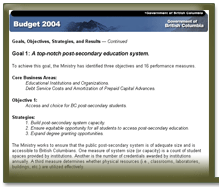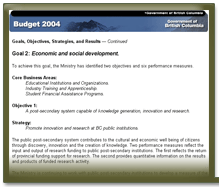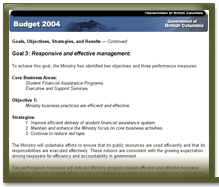 |
|
Goals, Objectives, Strategies and ResultsThe Ministry goals and objectives are multi-year commitments for the post-secondary education system in British Columbia. These goals are consistent with the Ministry's mandate and vision, and reflect the Ministry responsibility in providing leadership and policy direction to the post-secondary system. Key strategies are included to indicate specific areas of Ministry activity and initiative. To determine progress in achieving goals and objectives, 25 performance measures were selected. For each performance measure, baseline data and annual performance targets for the next three years are identified, as appropriate. For the 2004/05 Service Plan, three performance measures have been identified that were not included in the 2003/04 Service Plan. Nine measures that were included in the 2003/04 Service Plan were either considered complete or were re-evaluated in regard to their efficacy and have not been included in the 2004/05 Service Plan. These measures will, however, be reported in the Ministry's 2003/04 Annual Service Plan Report. Measuring the diverse post-secondary education system in BC is a complex and long-term matter. The performance measures included in this plan do not represent the complete or exhaustive set of measures that could be used to reflect progress achieved toward Ministry goals and objectives. Rather they represent the collaborative efforts of Ministry and system representatives to find the key measures essential to describing Ministry and system performance. Each individual measure taken in isolation will not provide enough information to allow for reliable and accurate evaluation of post-secondary system performance. All measures should be considered together when assessing progress toward stated goals and objectives.
Risk ManagementThe implementation of Enterprise-Wide Risk Management (ERM) is a new public service initiative designed to promote and demonstrate balanced decision-making and public accountability. The Ministry is in the early stages of a three-year ERM implementation plan suitable for its core business areas.
DeregulationThe Ministry is on track to meet its commitment to a one-third reduction in total regulatory requirements by 2004. The Ministry's commitment is aligned with Government's New Era commitment to reduce the regulatory burden in British Columbia. This is a critical initiative to boost efficiency, reduce costs and stimulate innovation. The Ministry has consulted and will continue to consult with public and private post-secondary institutions and professional organizations on how to best meet this commitment. Further details are contained in the Ministry's Three-Year Deregulation Plan. In 2004/05, the Ministry will reduce its total number of regulatory requirements to 1,241, down from 1,861 in June 2001.
|
||||||||||||||||||||||||||||||||||||||||||||||||||||||||||||||||||||||||||||||||||||||||||||
|
|||||||||||||||||||||||||||||||||||||||||||||||||||||||||||||||||||||||||||||||||||||||||||||



